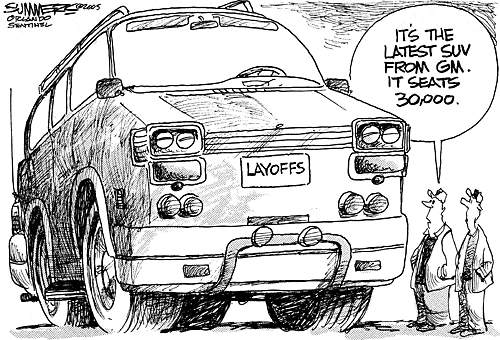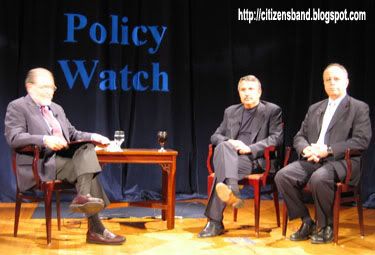Last week, the Nobel Peace Prize was announced to a most deserving candidate, Muhammad Yunus and the Grameen Bank, for their pioneering use of "micro-loans" to help villagers in third world countries. In a year where the finalists for the prize reportedly included Cindy Sheehan and Bono of U2, it was nice to see a great cause receive world attention. Apparently Yunus had long been championed by his friend, former president Bill Clinton.
I read about Yunus, the founder of Grameen, in an international economics class I took last year. His simple but powerful idea--that even a very small amount of money could make a disproportionate difference to a poor person--sprung from the need to give villagers access to capital. After all, banks will loan to the middle- and upper-classes, but not the poor, because there is a great risk they will not be able to repay the loan.
Since Yunus gave out his first loan--$27 of his own money in Bangladesh in 1974--Grameen has been giving out small loans (typically less than $150) at reasonable interest rates to poor villagers. To help ensure repayment, the bank lends money not to individuals but "solidarity groups" of villagers, who apply for the loan together, act as co-guarantors together, and work together to make proper use of the funds. The idea has proved surprisingly effective--the bank reports a repayment rate of over 98%.
Another important feature of Grameen is that they predominantly lend to groups of women, helping empower them in a society where they are traditionally repressed. Over 6.5 million people have borrowed from the Grameen Bank, with over $5.7
billion given out in loans. It has enabled social transformation from the bottom up.
Congratulations to Yunus and the Grameen bank.
* * *
One observation I haven't seen in the news is the significance of another Muslim winning the Nobel Peace Prize. With all the contemporary tension between the Muslim world and the West (for example, recall recent Muslim anger at comments by Pope Benedict XVI), Yunus proves that there are real idols to look up into in the Muslim world (read:
not Osama bin Laden) who are affecting positive change on their societies.
For the record, the past two winners of the Peace Prize have been Muslim: Yunus this year, and Mohammed ElBaradei in 2005. Don't forget three out of the past four have been Muslim--human rights activist Shirin Ebadi won in 2003.
* * *
In today's
New York Times, John Tierney commends the selection of Yunus for the award before cheekily suggesting that
Wal-Mart is even more deserving of recognition for its role in alleviating world poverty. Tierney points out that the thousands of third world villagers who gain jobs in factories make more than the prevailing labor rate in their home country.
"Making toys or shoes for Wal-Mart in a Chinese or Latin American factory may sound like hell to American college students — and some factories should treat their workers much better... But there are good reasons that villagers will move hundreds of miles for a job.
Most 'sweatshop' jobs — even ones paying just $2 per day — provide enough to lift a worker above the poverty level, and often far above it, according to a study of 10 Asian and Latin American countries by Benjamin Powell and David Skarbek. In Honduras, the economists note, the average apparel worker makes $13 a day, while nearly half the population makes less than $2 a day."
That distinction is one many people don't seem to grasp. Especially on a liberal campus here at the University of Maryland, it is common to see various student groups demanding "appropriate" pay for these workers, or for me to see a fellow student in one of my business classes go off and rip Wal-Mart (happened this evening, in fact).
Rest assured, I abhor sweatshops and abusive labor practices, but it's important to note what the facts are. This is not a liberal-conservative issue either; my first real introduction to the subject came from reading a Paul Krugman column in 2001 entitled
"Hearts and Heads." Anyone familiar with Krugman knows he's a dependable lefty, so try this on for size:
"[T]hird-world countries aren't poor because their export workers earn low wages; it's the other way around. Because the countries are poor, even what look to us like bad jobs at bad wages are almost always much better than the alternatives."
Keep that in mind next time you hear someone lay into a Wal-Mart or Nike for paying a buck fifty an hour, remember that in most cases, that worker is glad for it. Not to mention it's probably a buck more an hour than they'd be getting working a local job.
More importantly, many people have shown (and I think I've read this either from Thomas Friedman or Jeffrey Sachs) that these type of factory jobs are the first step in the advancement of the poor in third world countries. As I recall, it works like this: rural villagers move to the cities and work in aforementioned factories, where they make more money than ever before.
They are able to better support their families and provided a better upbringing for their children, which includes a better education. Their children then can take advantage of the more advanced jobs that have come to the country after the success of the initial lower-level factory-type work.
Anyone see a problem with that, let me know.
File under: current affairs,
economics,
globalization




